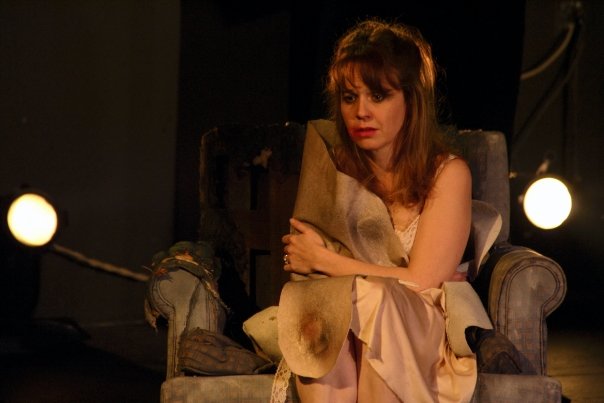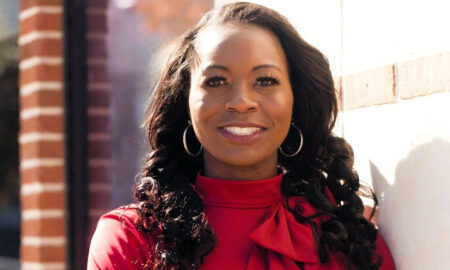

Today we’d like to introduce you to Jennifer Decker.
Jennifer, let’s start with your story. We’d love to hear how you got started and how the journey has been so far.
In 2001, I was an actress, and a playwright/English Professor friend of mine, John Harvey, had written a play and suggested we produce it ourselves. The theatre scene in Houston at that time was small. We got some actors, scraped some money together and figured out how to write a press release. We thought it would be a one-time experience, but we needed a name in order to advertise the play. We chose Mildred’s Umbrella from a Gertrude Stein poem from a textbook he was using for a class. Having had no experience in production or even directing, it was a challenge for me, but we did it again the next year, and collected a small group of artists who liked the creative and experimental nature of what we were doing, and in the fourth year, we started producing two-show seasons. We worked in whatever space we could find, from bars and converted conference rooms to rented black box theatres and dance studios. Eventually, in 2012, we found a small theatre space, Studio 101, a 100-seat black box theatre in the First Ward Arts District, which we share with another small company. This has enabled us to upgrade our technical capabilities and offer our patrons a consistent location to attend our shows. Around this time, I realized that I was most often choosing plays written by women, and even the plays I chose by men had primarily female casts and protagonists, so we officially shifted our mission in 2013 to make female theatre artists our focus. From our humble beginnings as a one-time collaboration of local artists to today, Mildred’s has grown into a fixture of Houston’s performing arts community. We are known for pushing the envelope of theatre with risky, thought-provoking art. We have produced thirteen full seasons of mainstage plays, performed in conjunction with lectures created Fringe Festival pieces, and developed a popular festival of short originals (“Museum of Dysfunction”), currently in its ninth year. We have pledged our support for the “50/50 by 2020” campaign of the League of Professional Theatre Women, and remain committed to promoting gender parity in the theatrical arts. In the last two seasons, we have worked with The Houston Area Women’s Center, United Against Human Trafficking, The University of Houston Women’s Studies department, and the Harris County DA’s office, using our plays and talk-back panels to raise awareness of issues such as domestic violence, date rape, sex-trafficking and teen pregnancy. We still operate on a shoestring, but we’ve grown steadily since the beginning, and continue to grow and flourish, even in this uncertain economic climate.
Has it been a smooth road?
There are always challenges in creating art. First of all, Houston has historically been a business city. Before the last decade, there were not many theater ventures to survive beyond a few projects. Though many companies begin with some form of stable funding, we didn’t have those kinds of resources, and had to scrape together money wherever we could find it. No theater survives on ticket sales. We’d have to charge $100 each for tickets in order to make that happen, and we want to make sure theater is accessible for everyone, so we’d never expect that from our patrons. It isn’t always easy, but we’ve managed to cobble together a budget with small grants, many small donations and our ticket sales.
Another challenge is getting the word out about our company and productions. We used to rely on whatever local journalists would write about or review our plays, because we don’t have a budget for advertising, however, social media has been a huge help in managing that obstacle. There is also a challenge for any theatre that is producing new or risky work, as we never know how it will be received for the first time by the press or the public. Sometimes it’s a huge hit, and sometimes we catch heat, but we don’t plan to change our mission. We feel it is our responsibility to bring new art to the city, to produce work that makes people strongly think and feel about the material we are presenting and to provide more opportunities for women on the stage.
So, as you know, we’re impressed with Mildred’s Umbrella Theater Company – tell our readers more, for example what you’re most proud of as a company and what sets you apart from others.
We present Houston premiers, and sometimes even world premieres of thought-provoking, sometimes experimental plays that are chosen to focus on the work of women in theatre. These plays are either written by women (generally 75% of them), or they have strong female ensembles or a female main character. We are not interested in plays that are specifically about being defined or labeled as women. We are interested in plays that deal with the human experience, but those humans happen to be women.
In 2014, we discovered that only 18% of plays written by women were produced in the U.S. in 2009, and 20% of the roles on stage were female roles, even though 60% of theater-goers were women (at that time). We didn’t think that was a good balance, and we wanted to change it. We had always chosen more plays by women (even premiered a few prominent writers locally) so we decided to make it our mission to help promote gender parity in American theater.
Let’s touch on your thoughts about our city – what do you like the most and least?
I pretty much grew up in Houston. Since the early 80’s, when I arrived as a child, I have seen this city grow from a thinly spread city, where there were still huge plains of land where the suburbs are now, and downtown was a ghost town at night, to this thriving, crowded, diverse metropolis.
Things I like best: the wide variety of fabulous food from every country you can think of, the diversity of people, the huge amount of art and culture being created, the lack of freezing cold winters, and taco trucks.
Things I like least: gentrification and complete re-construction of historical neighborhoods (pricing out of original residents and demolishing old architecture to make room for McMansions and hipster bars), The constant traffic, the reduced funding of the arts in schools (though I suppose that’s a national issue) and the humidity.
Pricing:
- $25.00 general admission to our shows
- $15 student/senior admission to our shows
Contact Info:
- Address:1824 Spring Street, Houston TX 77007
- Website: mildredsumbrella.com
- Phone: 832-463-0409
- Email: jennifer@mildredsumbrella.com or info@mildredsumbrella.com
- Instagram: https://www.instagram.com/mildredsumbrella/
- Facebook: https://www.facebook.com/MildredsUmbrella/
- Twitter: https://twitter.com/mildreds
- Yelp: https://www.yelp.com/biz/mildreds-umbrella-theater-company-houston





Image Credit:
Gentle Bear Photography
Anthony Rathbun
Getting in touch: VoyageHouston is built on recommendations from the community; it’s how we uncover hidden gems, so if you know someone who deserves recognition please let us know here.

















